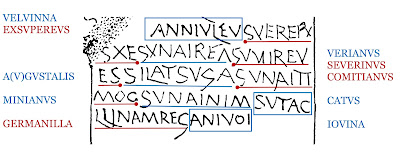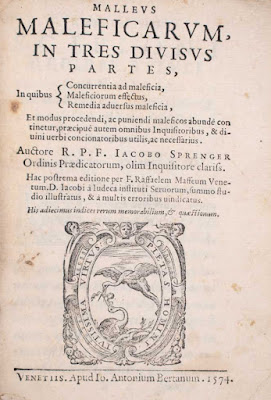Quōmodo dīcitur "witch"?
[1] sāga, -ae [1/f]: witch; sooth-sayer; prophetess
[2] striga, -ae [1/f]: [i] witch; sorceress; hag [ii]
vampire; the word is derived from Anc. Gk στρίξ [stríx] ‘a screech-owl,’ a
creature believed by the ancients to suck the blood of young children
https://www.perseus.tufts.edu/hopper/text?doc=Perseus:text:1999.04.0062:entry=striga-harpers
[3] strīx, strīgis [3/f]: screech-owl; the bird was believed
to bring bad omens and became associated with evil spirits and vampirism
https://en.wiktionary.org/wiki/screech_owl#English
[4] venēfica, -ae [1/f]: [i] witch; sorceress [ii] female
poisoner
[5] image #1: haruspex, haruspicis [3/m]: diviner (who read
the intestines of sacrificed animals); sooth-sayer; the term is clearly
indicated in the inscription
[6] augur, -is [3 m/f]: also a diviner or soothsayer who
based predictions on the flights of birds; augurium, -ī [2/n]: augury,
referring to the practice of this type of divination
[7] magus, -ī [2/m]: wizard; magician; the term could also
be used both in a derogatory way to refer to a trickster or a charlatan and to
describe the Magician of the Tarot cards; the feminine equivalent is maga, -ae
[1/f]: enchantress; magician (fem.); witch
[8] maleficus, -ī [2/m]: evildoer; sorcerer; magician
[9] From the last word, we find far less “fun” mythological
stuff in the feminine form of maleficus:
image #2: Malleus Maleficārum │ the Hammer of Witches, a
book published in 1486 which proposed that witches be burned at the stake; the
book was revived, ironically, during the period of the Renaissance and partly
contributed to the prosecution of witches in the 16th and 17th century; the
image shows the 1574 edition
https://en.wikipedia.org/.../Witch_trials_in_early_modern...
[10] Image #3: from Latin familiāris, -e (belonging
to the household; familiar; intimate) or from the related noun familiāris,-is
[3/m] (servant; acquaintance), there is the English derived term familiar.
A witch’s familiars were attendant evil spirits often in the
form of animals. We tend to associate witches with black cats but the image
from 1579 of Hainous and Horrible Actes Committed by Elizabeth Stile also
shows toads.
image #4: early - possibly the earliest - depiction of
witches on broomsticks (1451)
Some Halloween reading from the Roman authors:
https://medium.com/.../wicked-witches-of-latin-literature...
And if you want to know how to spot a witch, the UK Monty
Python comedy team, mocking the brainless English peasantry in the 10th
century, will tell you ...
https://www.youtube.com/watch?v=rf71YotfykQ



















